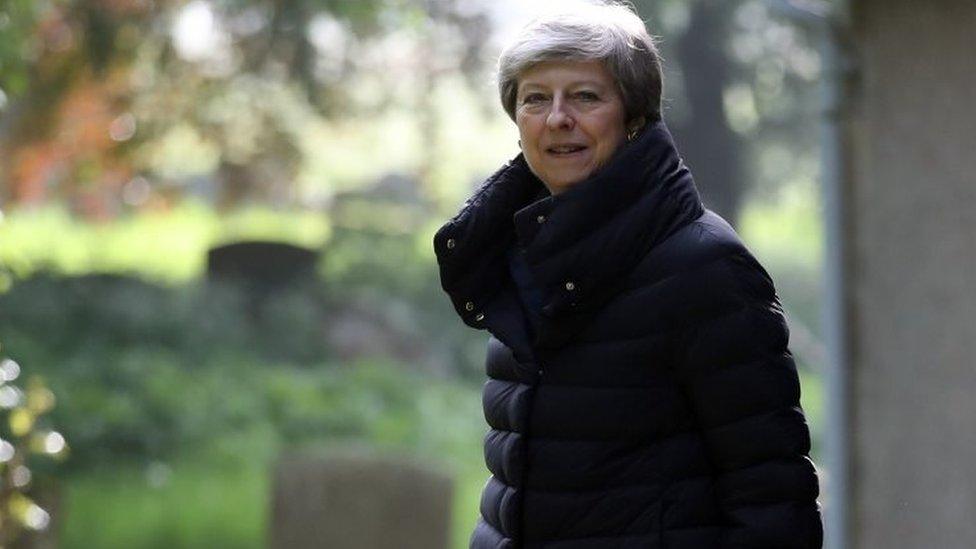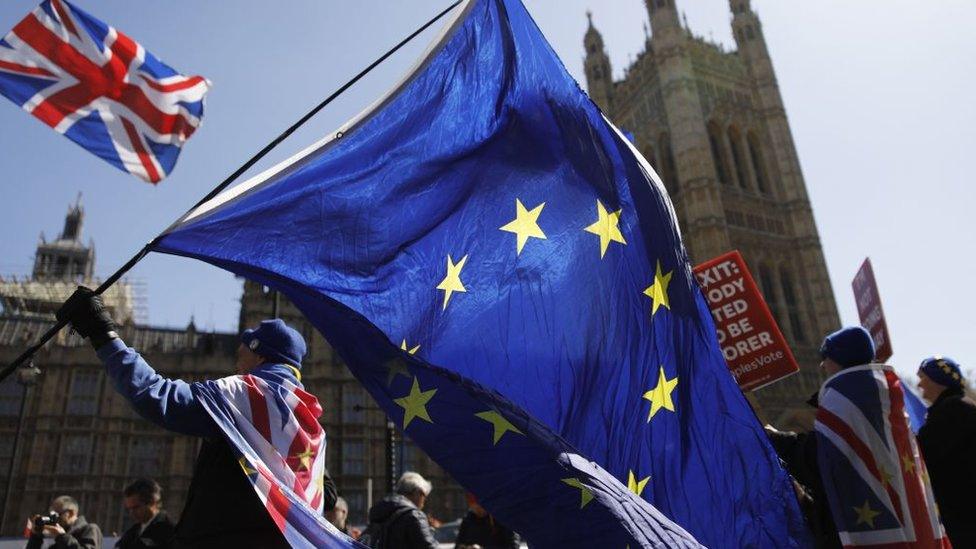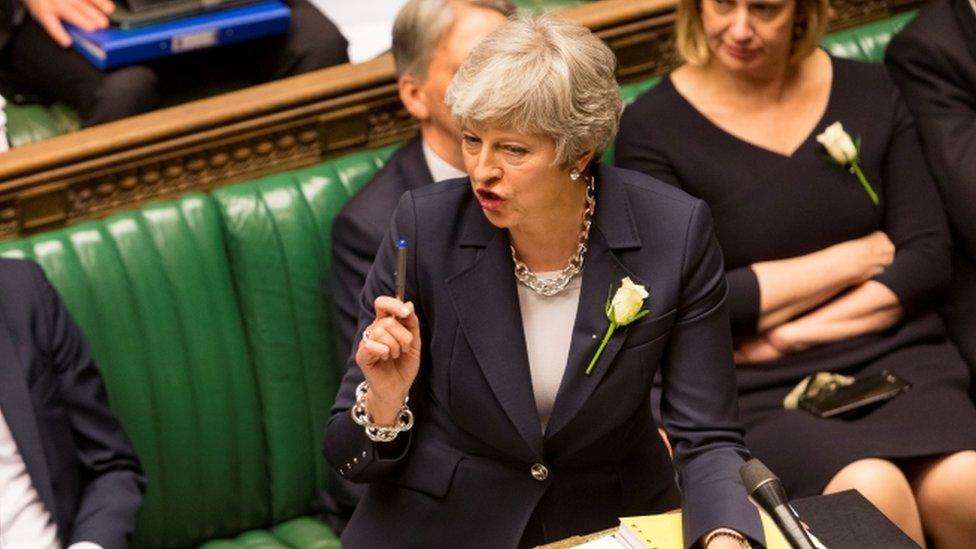Brexit: Is it bonkers to push the PM's plan again?
- Published

It's not crazy to ask if it's bonkers for the government to have yet another go at getting the prime minister's plan for Brexit through Parliament.
It's been defeated - and very heavily defeated - on several occasions.
The prime minister who is trying to push it through is off soon, so has not exactly got much political authority left.
And the party that's, in theory, trying to drive through the legislation is rapidly becoming consumed by what and who is coming next, rather than spending all of its time and effort trying to get this plan over the line.
But a vote on the Withdrawal Bill is likely to take place some time in the first week of June.
It's not long to transform the landscape completely. But some of those inside the government machine think it is still worth trying.
There are lots of different arguments on both sides, so as you know, sometimes I reckon the easiest thing is to make a list.
Why does the government think they could have a chance, however slim, of getting the numbers?
1. The next big vote will not be the same as the previous "meaningful votes".
It's a vote on the whole Brexit bill, the Withdrawal Agreement Bill, that would implement the laws required for us to leave the European Union.
MPs are not being asked (theoretically at least) to give a simple thumbs up or thumbs down to the idea of leaving, but to give a verdict on a much bigger package of legislation.
So when MPs complain there is nothing different about it this time, in this sense, that's just not true.
2. When it emerges, that package will include some promises that have been made to Labour MPs, over increasing protections on workers' rights or the environment.
They might not seem "new and bold", as Number 10 likes to claim, because these ideas have been discussed for weeks and weeks on end.
But it will be the first time that we will have seen these commitments translated into black and white in draft laws, and government insiders hope this might tempt a few more Labour MPs to back it.
3. The next big vote will be on what's called the "second reading".
This is when MPs give their verdict on whether or not the discussion of the bill should progress to the next round of scrutiny, where MPs would look at it line by line, making changes as they see fit, before going on, in theory, to a final vote in the Commons.
So backing a bill at this stage doesn't mean at all that it ends up becoming law.
It would, the government hopes, just allow the wheels of this messy process to start turning again.
4. Bear with me for this next bit - MPs can make changes to bills, or put forward amendments, as a bill goes through Parliament.
If, however, a bill is killed off at its second reading, it never progresses.
So MPs don't get to suggest, discuss and then vote on the changes they'd like to make.
In the coming days, expect ministers to try to hammer home this point.
Whether an MP is a supporter of another referendum, a Norway-style deal, removing the backstop, or frankly, flying to the moon, if there is no bill being discussed they have no way of pushing their ambition to a vote in Parliament that could actually change the law and achieve their dream.
Behind the scenes, therefore, there is a lot of effort going on into contacts between the government and supporters of another referendum.
This government does not support another referendum, and frankly, Theresa May is more likely to do the samba down Whitehall than make a positive promise to suggest one.
But, the case will be made to backers of another vote, that if they don't vote yes at this stage of the process, they will never get a chance to change the law to make it happen.
It's not impossible too that the government might look at how it would whip its own MPs over another referendum at the next stage, if it gets that far.
One prominent supporter of another referendum tells me that if the prime minister committed to support the bill and if they have been successful in changing it to mean there's another referendum, then "things could get interesting".
In other words - the government is never going to promote another referendum. But if it implies it won't stand in the way of those pushing for one if they can win over Parliament, then the numbers willing to back the PM's plan at the first stage could look rather different.
5. Phew - this bit is more straightforward. Some ministers reckon if the Tories are hammered at the European elections and Labour is squeezed too, a fair number of MPs might be spooked into backing the PM's plans and just get this bit of Brexit done.
There are a lot of people in Westminster in both of the main parties who, rightly or wrongly, just want this first phase to be over.
If, and it's still an if, the results of the European elections are as awful for the two big established parties as feared, could some of their MPs be persuaded to support the prime minister's plan after all?
With the prime minister pretty much saying she is off after this vote, whatever way it goes, it is hard to find anyone with any faith that another process of indicative votes on all sorts of different Brexit plans could viably step into the breach if this bill falls, so this might be it.
The problem for the government is that it's just not clear that very many MPs really want to listen to any of these arguments any more.
The rival factions in Parliament seem to be more dug into their trenches than ever before.
Mistakes in political handling have rubbed potential supporters up the wrong way over recent months.
Others, including very senior MPs are more, not less, angry about what's going on. One fumed to me today: "How can they ask me to vote for the thing, when I still haven't seen it?"
And MPs talk, perhaps more honestly than at any point in the last few months, about moving to a debate where many of them feel more comfortable - a question, ultimately, of halting the whole process, or leaving without a formal deal.
As Mrs May tries to persuade her cabinet, then our Parliament, of the merits of her last stand, the appeal of returning to a more binary argument is finding more reluctant support in Westminster, just at the moment when she tries to build the case for compromise again.
- Published20 May 2019

- Published11 May 2019

- Published13 May 2019
